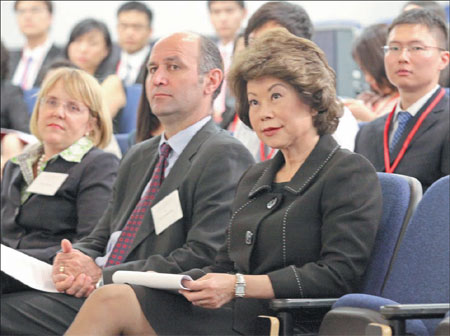Chinese students tackle US foreign policy
Updated: 2013-05-30 11:48
By Chen Weihua in Washington (China Daily)
|
||||||||
|
Former US labor secretary Elaine Chao (front right) sits among the audience on Wednesday evening before delivering a keynote speech at the 10th Foreign Policy Colloquium held by the National Committee on US-China Relations at the George Washington University Elliott School of International Affairs. Sun Chenbei / China Daily |
While Chinese President Xi Jinping and US President Barack Obama look forward to knowing each other's thinking better at their meeting in Sunnylands, California, on June 7-8, a group of Chinese students at US universities are spending three days this week learning how American foreign policy is formed.
Elaine Chao, the US secretary of labor from 2001 to 2009, gave the students her views on China-US relations and the unique features of the American culture and society, telling them to interact with Americans and don't be afraid of making mistakes.
"You can engage in personal diplomacy," she told some 150 Chinese students on Wednesday at the 10th Foreign Policy Colloquium held by the National Committee on US-China Relations (NCUSC) at the George Washington University Elliott School of International Affairs.
Chao, the first Chinese and Asian-American woman appointed to the US cabinet, described American society as diverse, individualistic, less hierarchical and full of energy and based on high trust.
"I hope students from both countries can learn how diverse each country is," she said.
Chao described the stark difference of how decisions are made in each country. As a former deputy transportation secretary, Chao said it takes 20 years to build an airport and 18 years to build a road in the US because "everybody has to agree and consensus has to be built".
"China is a very efficient form of decision-making," Chao said. "If the government wants to build a road, it will be built in six months, 12 months or at most 18 months."
Yang Liu, a student at North Dakota State University, said the American society Chao described very much reflects what she experienced in the past year. A junior, Yang said she will apply for graduate school to study China-US relations.
The Foreign Policy Colloquium is a three-day program designed by the NCUSCR to help Chinese graduate students in various disciplines better understand the complex forces that shape American foreign policy.
Each year, about 150 to 200 graduates students from universities across the US travel to Washington for the event, interacting with current and former administration officials and members of Congress, as well as representatives from academia, the military, think tanks, lobbying firms and the media.
"These students, among the best and brightest of China, will help shape China's understanding of America's foreign policy," said Stephen Orlins, president of NCUSCR. "Their experience at this program will pay dividends for US-China relations for decades to come."
There were almost 200,000 Chinese studying in universities across the US in the 2012 academic year, a hefty increase of 23 percent from the previous year, according to statistics from the Institute of International Education, a nonprofit organization in the US.
Chinese Ambassador to the United States Cui Tiankai could not attend Wednesday evening's event as previously scheduled. He had to travel back to China, accompanying the visiting US National Security Adviser Thomas Donilon, and to prepare for President Xi's meeting with President Obama next week.
Cui, a graduate of the Johns Hopkins University School of Advanced International Studies, is among a number of Chinese leaders who have studied in the US. He was China's vice-foreign minister before assuming his current post in March.
On Thursday, the students will have a day of lectures, including two on US foreign policy given by James Goldgeier, dean of School of International Service at American University, and David Rothkopf, CEO and editor-at-large of The Foreign Policy Group.
The students will also get an opportunity to visit key institutions such as State Department, Department of Commerce, Human Rights Watch and Environmental Defense Fund.
On Friday, the students will join panel discussions on global, security, economic and trade issues, ending the program on Friday evening with a speech by Orlins on his vision for the future of China-US relations.
chenweihua@chinadailyusa.com
(China Daily USA 05/30/2013 page1)

 Michelle lays roses at site along Berlin Wall
Michelle lays roses at site along Berlin Wall
 Historic space lecture in Tiangong-1 commences
Historic space lecture in Tiangong-1 commences
 'Sopranos' Star James Gandolfini dead at 51
'Sopranos' Star James Gandolfini dead at 51
 UN: Number of refugees hits 18-year high
UN: Number of refugees hits 18-year high
 Slide: Jet exercises from aircraft carrier
Slide: Jet exercises from aircraft carrier
 Talks establish fishery hotline
Talks establish fishery hotline
 Foreign buyers eye Chinese drones
Foreign buyers eye Chinese drones
 UN chief hails China's peacekeepers
UN chief hails China's peacekeepers
Most Viewed
Editor's Picks

|

|

|

|

|

|
Today's Top News
Shenzhou X astronaut gives lecture today
US told to reassess duties on Chinese paper
Chinese seek greater share of satellite market
Russia rejects Obama's nuke cut proposal
US immigration bill sees Senate breakthrough
Brazilian cities revoke fare hikes
Moody's warns on China's local govt debt
Air quality in major cities drops in May
US Weekly

|

|








